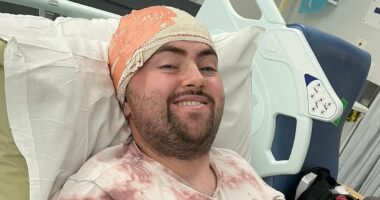Share this @internewscast.com
Eye-tracking technology may offer a more affordable alternative for detecting a genetic predisposition to Alzheimer’s disease compared to costly and invasive medical methods, as revealed by a recent study.
Researchers, including those from the University of Strathclyde, assessed how effectively this technology, enhanced by artificial intelligence, could pinpoint individuals genetically inclined to develop Alzheimer’s long before any symptoms emerge.
The study evaluated a system known as ViewMind Atlas, which combines eye-tracking capabilities and software to analyze brain health functionally.
Remarkably, the system accurately identified individuals carrying a genetic mutation, achieving 100% accuracy for those with symptoms and 96% for those without any signs.
The study’s participants came from extended families in Colombia, utilizing an AI-driven eye-tracking model to differentiate individuals based on their risk or presence of Alzheimer’s disease.
Findings indicate that these tests surpass traditional cognitive assessments in accuracy, which frequently fail to detect Alzheimer’s until symptoms become more pronounced.
Lead author Professor Mario Parra Rodriguez said: “Most of the diagnostic approaches used in dementia are expensive and invasive, because they require injection of chemical radiotracers or extraction of fluids from the body that normally require hospital settings.
“ViewMind Atlas is helping us to predict Alzheimer’s dementia in people years before it becomes symptomatic. Doctors will receive people who are probably not yet at the stage of dementia, but they are noticing that something is going on and may have a family history.
“One of the greatest puzzles that providers face is to decide what the potential problem could be; is it age-related forgetfulness and not necessarily dementia? Or do these cognitive problems point towards a risk of dementia in the future, so that they could act promptly rather than waiting until the person is symptomatic?”
Dementia and Alzheimer’s explained
Dementia and Alzheimer’s disease are often confused, but they are actually quite different. Dementia is an umbrella term that includes various syndromes, such as Alzheimer’s disease. This means Alzheimer’s is a form of dementia, but dementia as a whole cannot be classified as a type of Alzheimer’s.
NHS figures shows that over 944,000 people in the UK live with dementia, with approximately one in 11 people over age 65 affected. Alzheimer’s disease is the most prevalent form, comprising roughly 60 to 70% of cases, as reported by the World Health Organisation.
Alzheimer’s is a progressive condition, with symptoms gradually emerging over time. Usually, the initial signs include mild memory problems, such as forgetting names or conversations.
Nonetheless, as the condition progresses, the NHS indicates that further signs could emerge, such as:
- Hallucinations
- Difficulties with communication, speech or language
- Trouble making decisions
- Confusion, disorientation or getting lost in familiar places
- Low moods and anxiety
- Behavioural changes – increasing aggression or suspicion
- Problems moving around without assistance
Advice from the NHS adds: “There’s currently no cure for Alzheimer’s disease, but medicines are available that can help relieve some of the symptoms. Various other types of support are also available to help people with Alzheimer’s live as independently as possible, such as making changes to your home environment so it’s easier to move around and remember daily tasks.
“Psychological treatments such as cognitive stimulation therapy may also be offered to help support your memory, problem-solving skills and language ability.”
Anyone displaying symptoms of Alzheimer’s disease should see their GP. The NHS website also provides additional information.















